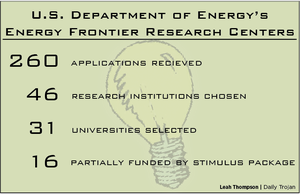Federal government selects USC for research initiative
 USC researchers will take part in a nationwide research initiative during the next five years, as federal funding will go toward the establishment of a new center focused on energy conservation.
USC researchers will take part in a nationwide research initiative during the next five years, as federal funding will go toward the establishment of a new center focused on energy conservation.
The U.S. Department of Energy Office of Science will invest $777 million in Energy Frontier Research Centers — part of President Barack Obama’s Energy Frontier Research Center initiative, which aims to boost the number of scientific breakthroughs needed to increase the importance of energy in the economy. Out of approximately 260 applications from research institutions across the country, 46 were chosen — including USC.
Daniel Dapkus, a professor of electrical engineering and co-chair in the Ming Hsieh Department of Electrical Engineering in the Viterbi School of Engineering, will direct the program, which will focus on ways to conserve energy used from everyday light sources.
“We are focused on several goals,” said Mark Thompson, a chemistry professor who is the associate director of the center. “In solar cells, it is to understand the parameters limiting efficiency and light absorption.”
Thompson said another goal of the center was to improve the efficiency and color quality of solid state light sources.
The USC center — which has a total budget of approximately $16 million for the next five years — will be one of 16 that will be partially funded by Obama’s American Recovery and Reinvestment Act. The government will provide $12.5 million, and Viterbi and the College of Letters, Arts & Sciences will each contribute roughly $500,000 per year, said Yannis Yortsos, dean of Viterbi.
The government’s selection of USC as one of 31 universities where a center will be focused has larger implications for the university, Yortsos said, as USC now has the ability to play a pivotal role in the growing conservation movement.
“It shows that the energy initiative at the university is alive and kicking,” Yortsos said. “We are hoping for more centers in the area of energy for the future because it is a very important issue that has large implications for our future.”
Thompson said while the university’s selection was a compliment, the research team had high expectations to meet.
“It is a great honor that we were chosen, and really puts pressure on us to perform,” Thompson said. “We assembled a top-notch team that will deal in issues limiting the efficiencies of next generation solar cells and solid-state lighting sources. The U.S. Department of Energy saw the strength of our team and awarded us a center to pursue our proposed research objectives.”
